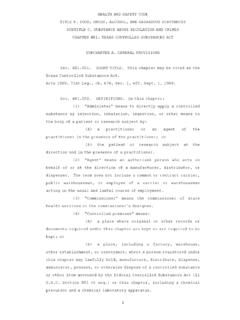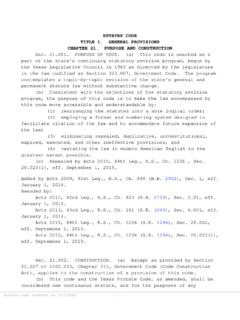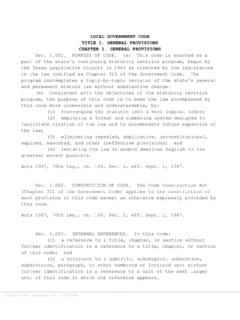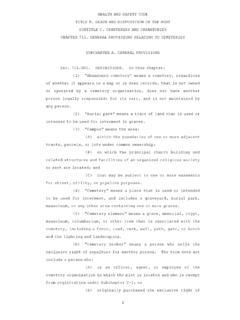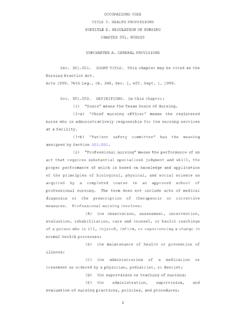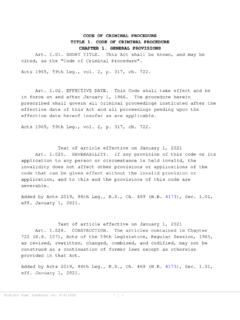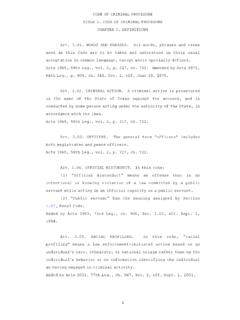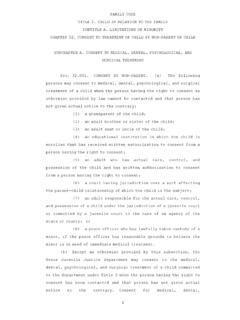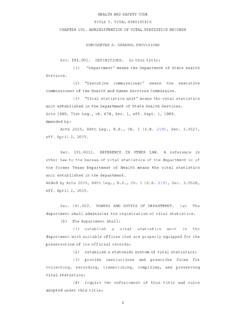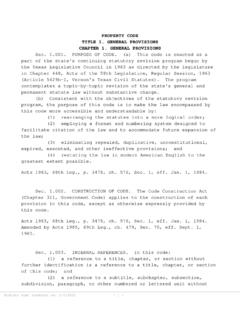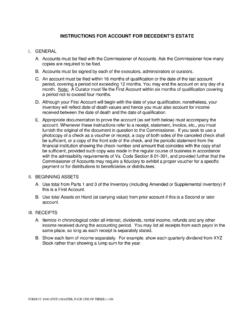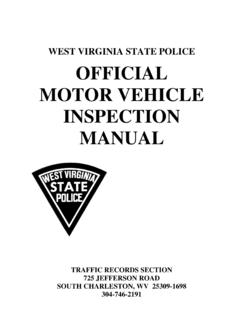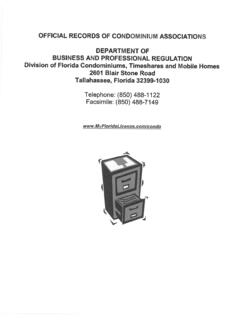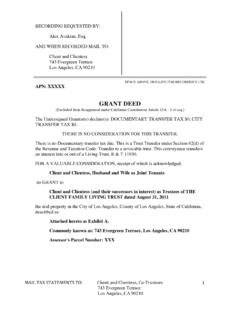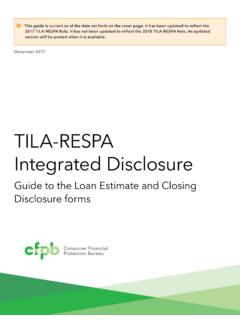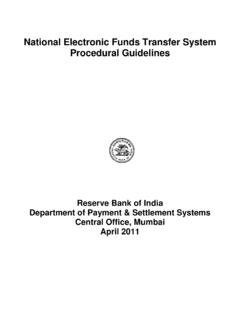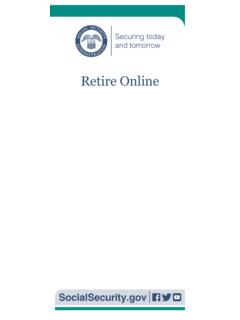Transcription of PENAL CODE CHAPTER 31. THEFT - Texas
1 PENAL CODETITLE 7. OFFENSES AGAINST PROPERTYCHAPTER 31. In this CHAPTER :(1)AA"Deception" means:(A)AAcreating or confirming by words or conduct afalse impression of law or fact that is likely to affect thejudgment of another in the transaction, and that the actor does notbelieve to be true;(B)AAfailing to correct a false impression of lawor fact that is likely to affect the judgment of another in thetransaction, that the actor previously created or confirmed bywords or conduct, and that the actor does not now believe to betrue;(C)AApreventing another from acquiringinformation likely to affect his judgment in the transaction;(D)AAselling or otherwise transferring orencumbering property without disclosing a lien, security interest,adverse claim, or other legal impediment to the enjoyment of theproperty, whether the lien, security interest, claim, or impedimentis or is not valid, or is or is not a matter of official record; or(E)AApromising performance that is likely toaffect the judgment of another in the transaction and that the actordoes not intend to perform or knows will not be performed, exceptthat failure to perform the promise in issue without other evidenceof intent or knowledge is not sufficient proof that the actor didnot intend to perform or knew the promise would not be performed.
2 (2)AA"Deprive" means:(A)AAto withhold property from the ownerpermanently or for so extended a period of time that a major portionof the value or enjoyment of the property is lost to the owner;(B)AAto restore property only upon payment ofreward or other compensation; or(C)AAto dispose of property in a manner that makesrecovery of the property by the owner unlikely.(3)AA"Effective consent" includes consent by a person1legally authorized to act for the owner. Consent is not effectiveif:(A)AAinduced by deception or coercion;(B)AAgiven by a person the actor knows is notlegally authorized to act for the owner;(C)AAgiven by a person who by reason of youth,mental disease or defect, or intoxication is known by the actor tobe unable to make reasonable property dispositions;(D)AAgiven solely to detect the commission of anoffense; or(E)AAgiven by a person who by reason of advancedage is known by the actor to have a diminished capacity to makeinformed and rational decisions about the reasonable disposition ofproperty.
3 (4)AA"Appropriate" means:(A)AAto bring about a transfer or purportedtransfer of title to or other nonpossessory interest in property,whether to the actor or another; or(B)AAto acquire or otherwise exercise control overproperty other than real property.(5)AA"Property" means:(A)AAreal property;(B)AAtangible or intangible personal propertyincluding anything severed from land; or(C)AAa document, including money, that representsor embodies anything of value.(6)AA"Service" includes:(A)AAlabor and professional service;(B)AAtelecommunication, public utility, ortransportation service;(C)AAlodging, restaurant service, andentertainment; and(D)AAthe supply of a motor vehicle or otherproperty for use.(7)AA"Steal" means to acquire property or service bytheft.(8)AA"Certificate of title" has the meaning assigned , Transportation Code.(9)AA"Used or secondhand motor vehicle" means a usedmotor vehicle, as that term is defined by ,Transportation Code.
4 (10)AA"Elderly individual" has the meaning assigned (c).(11)AA"Retail merchandise" means one or more items oftangible personal property displayed, held, stored, or offered forsale in a retail establishment.(12)AA"Retail THEFT detector" means an electrical,mechanical, electronic, or magnetic device used to prevent ordetect shoplifting and includes any article or component partessential to the proper operation of the device.(13)AA"Shielding or deactivation instrument" means anyitem or tool designed, made, or adapted for the purpose ofpreventing the detection of stolen merchandise by a retail theftdetector. The term includes a metal-lined or foil-lined shoppingbag and any item used to remove a security tag affixed to retailmerchandise.(14)AA"Fire exit alarm" has the meaning assigned , Health and Safety 1973, 63rd Leg., p. 883, ch. 399, Sec. 1, eff. Jan. 1, by Acts 1975, 64th Leg.
5 , p. 914, ch. 342, Sec. 9, eff. , 1975; Acts 1985, 69th Leg., ch. 901, Sec. 2, eff. Sept. 1, 1985;Acts 1993, 73rd Leg., ch. 900, Sec. , eff. Sept. 1, 1994; Acts1997, 75th Leg., ch. 165, Sec. , eff. Sept. 1, 1997; Acts2003, 78th Leg., ch. 432, Sec. 1, eff. Sept. 1, by:Acts 2011, 82nd Leg., , Ch. 323 ( ), Sec. 1, 1, OF THEFT OFFENSES. THEFT asdefined in a single offense supersedingthe separate offenses previously known as THEFT , THEFT by falsepretext, conversion by a bailee, THEFT from the person,shoplifting, acquisition of property by threat, swindling,swindling by worthless check, embezzlement, extortion, receiving3or concealing embezzled property, and receiving or concealingstolen 1973, 63rd Leg., p. 883, ch. 399, Sec. 1, eff. Jan. 1, by Acts 1993, 73rd Leg., ch. 900, Sec. , eff. Sept. 1, (a) A person commits an offense if heunlawfully appropriates property with intent to deprive the ownerof property.
6 (b)AAAppropriation of property is unlawful if:(1)AAit is without the owner s effective consent;(2)AAthe property is stolen and the actor appropriatesthe property knowing it was stolen by another; or(3)AAproperty in the custody of any law enforcementagency was explicitly represented by any law enforcement agent tothe actor as being stolen and the actor appropriates the propertybelieving it was stolen by another.(c)AAFor purposes of Subsection (b):(1)AAevidence that the actor has previouslyparticipated in recent transactions other than, but similar to,that which the prosecution is based is admissible for the purpose ofshowing knowledge or intent and the issues of knowledge or intentare raised by the actor s plea of not guilty;(2)AAthe testimony of an accomplice shall becorroborated by proof that tends to connect the actor to the crime,but the actor s knowledge or intent may be established by theuncorroborated testimony of the accomplice.
7 (3)AAan actor engaged in the business of buying andselling used or secondhand personal property, or lending money onthe security of personal property deposited with the actor, ispresumed to know upon receipt by the actor of stolen property (otherthan a motor vehicle subject to Chapter501, Transportation Code)that the property has been previously stolen from another if theactor pays for or loans against the property $25 or more (orconsideration of equivalent value) and the actor knowingly orrecklessly:(A)AAfails to record the name, address, and4physical description or identification number of the seller orpledgor;(B)AAfails to record a complete description of theproperty, including the serial number, if reasonably available, orother identifying characteristics; or(C)AAfails to obtain a signed warranty from theseller or pledgor that the seller or pledgor has the right topossess the is the express intent of this provisionthat the presumption arises unless the actor complies with each ofthe numbered requirements;(4)AAfor the purposes of Subdivision (3)(A),"identification number" means driver s license number, militaryidentification number, identification certificate, or otherofficial number capable of identifying an individual;(5)AAstolen property does not lose its character asstolen when recovered by any law enforcement agency.
8 (6)AAan actor engaged in the business of obtainingabandoned or wrecked motor vehicles or parts of an abandoned orwrecked motor vehicle for resale, disposal, scrap, repair,rebuilding, demolition, or other form of salvage is presumed toknow on receipt by the actor of stolen property that the propertyhas been previously stolen from another if the actor knowingly orrecklessly:(A)AAfails to maintain an accurate and legibleinventory of each motor vehicle component part purchased by ordelivered to the actor, including the date of purchase or delivery,the name, age, address, sex, and driver s license number of theseller or person making the delivery, the license plate number ofthe motor vehicle in which the part was delivered, a completedescription of the part, and the vehicle identification number ofthe motor vehicle from which the part was removed, or in lieu ofmaintaining an inventory, fails to record the name and certificateof inventory number of the person who dismantled the motor vehiclefrom which the part was obtained.
9 (B)AAfails on receipt of a motor vehicle to obtaina certificate of authority, sales receipt , or transfer document asrequired by Chapter683, Transportation Code, or a certificate of5title showing that the motor vehicle is not subject to a lien orthat all recorded liens on the motor vehicle have been released; or(C)AAfails on receipt of a motor vehicle toimmediately remove an unexpired license plate from the motorvehicle, to keep the plate in a secure and locked place, or tomaintain an inventory, on forms provided by the Texas Department ofMotor Vehicles, of license plates kept under this paragraph,including for each plate or set of plates the license plate numberand the make, motor number, and vehicle identification number ofthe motor vehicle from which the plate was removed;(7)AAan actor who purchases or receives a used orsecondhand motor vehicle is presumed to know on receipt by the actorof the motor vehicle that the motor vehicle has been previouslystolen from another if the actor knowingly or recklessly:(A)AAfails to report to the Texas Department ofMotor Vehicles the failure of the person who sold or delivered themotor vehicle to the actor to deliver to the actor a properlyexecuted certificate of title to the motor vehicle at the time themotor vehicle was delivered.
10 Or(B)AAfails to file with the county taxassessor-collector of the county in which the actor received themotor vehicle, not later than the 20th day after the date the actorreceived the motor vehicle, the registration license receipt andcertificate of title or evidence of title delivered to the actor inaccordance with Subchapter D, Chapter520, Transportation Code, atthe time the motor vehicle was delivered;(8)AAan actor who purchases or receives from any sourceother than a licensed retailer or distributor of pesticides arestricted-use pesticide or a state-limited-use pesticide or acompound, mixture, or preparation containing a restricted-use orstate-limited-use pesticide is presumed to know on receipt by theactor of the pesticide or compound, mixture, or preparation thatthe pesticide or compound, mixture, or preparation has beenpreviously stolen from another if the actor:(A)AAfails to record the name, address, andphysical description of the seller or pledgor;(B)AAfails to record a complete description of the6amount and type of pesticide or compound, mixture, or preparationpurchased or received; and(C)AAfails to obtain a signed warranty from theseller or pledgor that the seller or pledgor has the right topossess the property.
